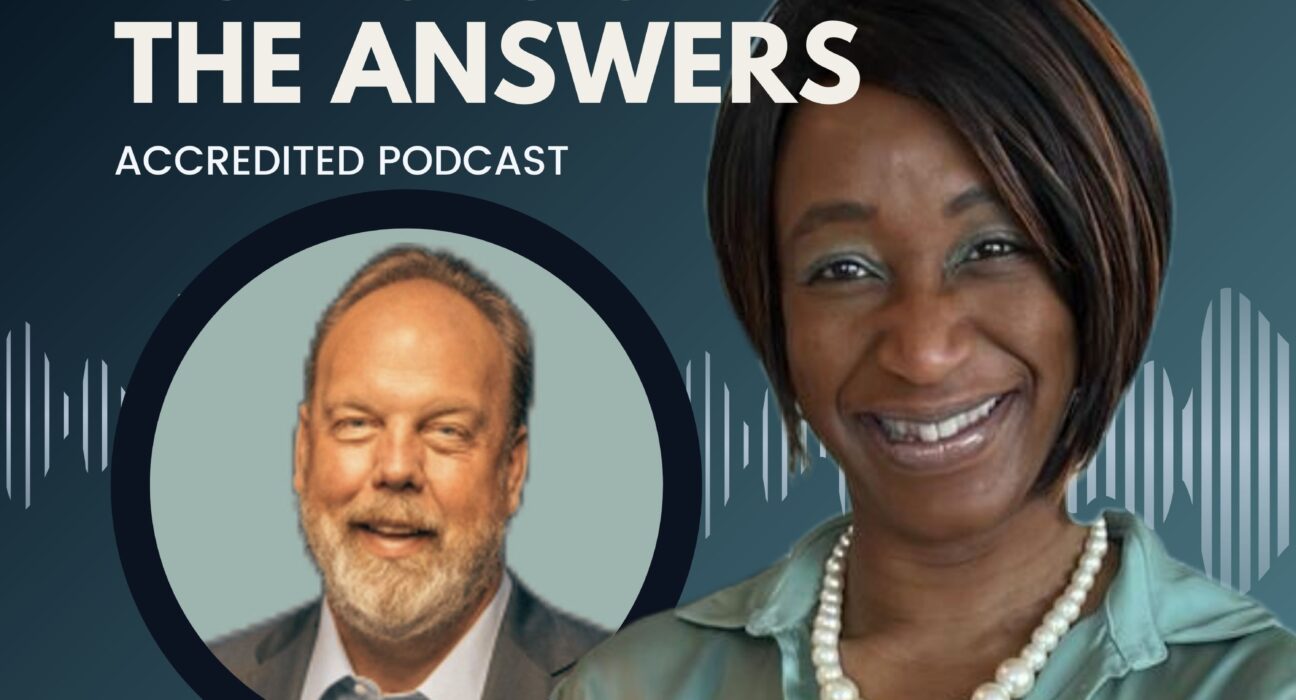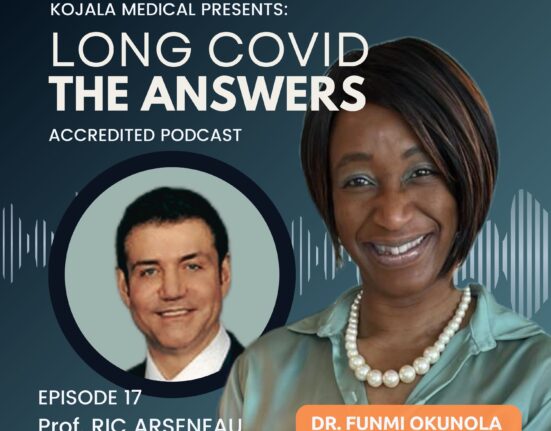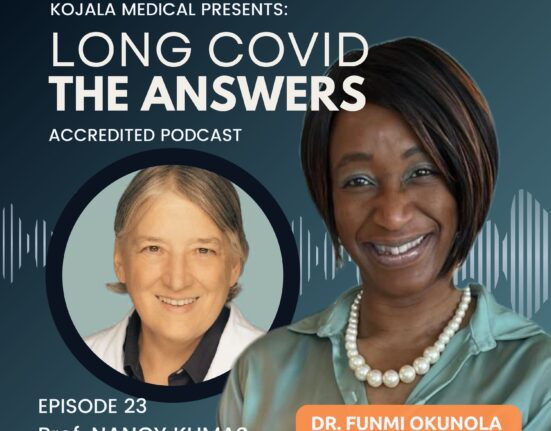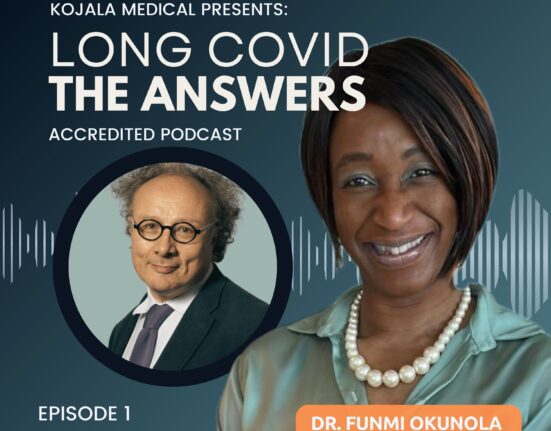
Prof James C Jackson and Dr Funmi Okunola discuss the challenges of accessing cognitive rehabilitation for Long COVID, highlighting long wait times and the importance of alternative evaluations by occupational therapists or speech pathologists. They emphasize compensatory strategies like goal management training as effective, while acknowledging the controversy surrounding restorative approaches and neuroplasticity.
Guest – Professor Jim Jackson
Note: The podcast has no bias. All conflicts of interest are highlighted with individual guests.
Healthcare Professionals | Earn 0.5 Certified Mainpro+® Credits! Please register/login to claim your CPD/ CEU credits.
Podcast Overview:
Prof James C Jackson and Funmi Okunola explore the impact of Long COVID on brain fog, discussing effective rehabilitation, access barriers, and the critical role of mental health in recovery.
Highlights:
- The effects of Long COVID on brain fog
- Rehabilitation strategies to combat brain fog
- Challenges in accessing timely care
- The importance of mental health support in Long COVID recovery
- Expert insights on managing cognitive issues
DISCLAIMER: The information in this podcast is provided for informational purposes only. You should not use any information discussed in this podcast and related materials to make medical or healthcare related decisions. Always consult a your physician or other qualified health care provider with regards to diagnosing managing your medical condition. Any medications or treatments, including any discussed in this podcast, should be initiated and managed by a qualified health care professional.
Podcast Transcript:
Healthcare Professionals: Please note to claim Certified CPD / CEU credits toward your medical license (Canada & reciprocal CPD/CEU Worldwide), you will need to register or log in.
Episode 10 – Brain Injury (Brain Fog) in Long COVID ft. Professor Jim Jackson
[00:00:00] Funmi Okunola: The information in this podcast is provided for informational purposes only. You should not use any information discussed in this podcast and related materials to make medical or healthcare related decisions. Always consult your physician or other qualified healthcare providers with regards to diagnosing and managing your medical condition. Any medications or treatments, including any discussed in this podcast, should be initiated and managed by a qualified healthcare professional.
Funmi Okunola: [00:00:00] Welcome to Long Covid – The Answers. Today’s Episode is entitled “Brain Fog or Brain Injury in Long Covid”. This interview is one of two Episodes recorded with neuropsychologist Professor James Jackson as part of our Neurological Long Covid section of the series.
Professor James Jackson is an internationally renowned expert on Long COVID and its effects on cognitive and mental health functioning. A licensed psychologist specializing in neuropsychology and cognitive rehabilitation, he completed his psychology residency at the Veteran Affairs Vanderbilt University School of Medicine Consortium in Nashville, Tennessee, United States, and received post-doctoral training in cognitive rehabilitation at the Oliver Zangwell Center in Ely, Cambridgeshire, England. He is a research professor of medicine and psychiatry at Vanderbilt, where he is also the co-founder and director of behavioral health at the [00:01:00] ICU Recovery Center, devoted to diagnosing and treating survivors of both mild and critical illness, including those who survived COVID-19. Welcome, Jim.
James Jackson: So great to be with you tonight. Thank you for having me. Thank you.
Funmi Okunola: Oh, you’re more than welcome. Jim, do you have any conflicts of interest to declare?
James Jackson: I don’t have any conflicts.
Funmi Okunola: Great. So, most of the questions in this podcast are based around Professor Jackson’s book, “Clearing the Fog – From Surviving to Thriving with Long COVID”, a practical guide which is frankly excellent and a book I highly recommend.
It’s one of the guides alongside the Long COVID handbook by Gez Medinger and Danny Altman that goes a long way to making sense of the confusion around managing Long COVID. I must add that I received no financial gain for this endorsement. Firstly, Jim, can you please explain what a neuropsychologist is?
James Jackson: Sure, uh, that’s a term, neuropsychologist, a little [00:02:00] bit of a tongue twister that many people are not very familiar with, but it’s a psychologist really that specializes in understanding the relationships between the brain and behavior, that specializes in being able to characterize things like cognitive impairment.
What is it? How severe is it? How does it affect you? How can we improve it? All of those things are under the purview, under the rubric, of what a neuropsychologist does, and I’m really grateful to work in this space. Uh, in some ways it feels like I’ve been preparing my whole life to work with Long COVID survivors with cognitive impairment, and it’s really been a privilege.
Funmi Okunola: Jim, I love the quote you give in the book by Thomas Edison – “the chief function of the body is to carry the brain around”. Bearing this in mind, can you please explain what brain fog is and why you consider brain fog in Long COVID to be more brain injury than [00:03:00] brain fog?
James Jackson: It’s an interesting term “brain fog”. There’s a famous quote, I don’t remember who said it now, but one of the chief justices in the United States back in the day. He was involved in a case involving pornography. How do you define pornography? and he famously said, “you don’t know how to define it, but you know when you see it”, that’s what he said.
Um, that definition I think applies to brain fog, right? Like, who knows how to define it? But you know it when you see it. If you talk to fifty different doctors and I think I’ve done this, you’ll get forty-two different definitions of brain fog. You know, if you talk to a hundred patients, who don’t like the term, by the way, they particularly dislike the term, you’ll get vastly different definitions of what it means. They tend to feel with Long COVID patients that it’s very minimizing. I think at the bottom it has to do with a lack of clarity cognitively. You’re not seeing things [00:04:00] clearly, you’re not as sharp in your thinking, your thinking isn’t as crisp as it used to be. That is, I think, what people mean when they use the term, but we’ve done patients a real disservice I think by not defining it. I think a far better term is “cognitive impairment”. Cognitive impairment is a term that has some teeth, has some meat, if you will, and I think it highlights how significant this problem is. Often that cognitive impairment is a brain injury, and in a way, to me, that’s good news. Nobody wants a brain injury, but it’s good news that we can label it accurately because we know how to treat brain injuries, and actually we’re pretty good at it. I’m not sure we know how to treat brain fog.
Funmi Okunola: What’s the difference between cognitive impairment in Long COVID and dementia such as Alzheimer’s?
James Jackson: It’s a really good question – that is the difference between cognitive impairment and Long COVID and dementia. I interact with so many patients a [00:05:00] week, dozens of patients probably this week, and I can guarantee you because I’ve heard them say it, that in many of the patients I’ve interacted with even this week, there is this really profound fear that they are in the throes of a dementia, that they’re developing a progressive, degenerating cognitive problem, and that keeps them up at night, frankly, and it’s really lovely to be able to say to them, “I don’t want to minimize your problems. They’re really significant but take a deep breath. This doesn’t seem to be dementia”. When we think of dementia, we think of a progressive condition that marches on. A year from now it’s going to be worse than it is right now, two years from now, worse than a year from now, right?
We keep doing the math five years from now, still worse. That doesn’t seem to be the pattern of cognitive impairment in most of our Long COVID patients. Our Long COVID patients typically have a pattern where they develop [00:06:00] new cognitive impairment that they didn’t have before, and that cognitive impairment may wax and wane a little bit, depending on stress, depending on various things, but it is what it is. It’s not getting worse over time. That’s the distinction between the cognitive impairment we see in Long COVID and dementia. It typically isn’t getting worse over time.
Funmi Okunola: That’s a relief. Jim, can you please talk about the symptoms of brain injury in Long COVID with regards to the six key domains of cognitive function?
James Jackson: Yes. We see people again often being told they have brain fog; often being told they have memory deficits. Their doctors don’t know exactly what those terms mean, and our patients certainly don’t know either. In general though, we see cognitive impairment and Long COVID in areas like attention, areas like processing speed, in some cases language, in other cases aspects of [00:07:00] memory – like working memory, that’s a big one where there are concerns, sometimes in visual spatial dimensions, but if I had to circle two, if I got on the whiteboard behind me with a red pen and circle two, they would be problems in attention and processing speed.
These seem to be the biggest things we see, and often what happens is people are quite convinced that they have problems with memory because they don’t remember where they put their keys. One of our patients recently put his keys in the refrigerator, right? He couldn’t find them. Another patient ran through a red light. There are a range of things we see, but when you break it down, these problems with memory often are really problems with attention. That is, it’s not that patients can’t remember, it is that they’re not attending, so when they reach back into their backpack to grab a memory, there isn’t one there.
It’s not because they lost [00:08:00] it, it’s because it was never really formed, and it was never really formed because they have these deficits in attention that are really foundational to all other cognitive abilities. So that’s what we often see. I think that’s why, in some cases, neurologists and psychiatrists sometimes prescribe the same medications for Long COVID that they use for ADD or ADHD.
We see that not uncommonly guanfacine would be one. I think the jury’s out about whether those work well or not. For some people they seem to, but the logic seems to be that for some this is like an ADD or ADHD type syndrome, and we’re going to treat it pharmacologically the same way. Is that a good idea? Is it a bad idea? You can find proponents, you can find opponents, but that’s the logic – that this is an attentional problem.
Funmi Okunola: Is there a difference between the brain injury seen in those hospitalized with COVID-19 and those who are not [00:09:00] hospitalized who caught SARS-CoV-2?
James Jackson: In our work at Vanderbilt, we interact with patients who never were hospitalized. They were perhaps just a little bit sick, and they developed Long COVID. We work with patients who were in the hospital, and then we work with patients who had what you might call the worst hospitalization of all, and those would be people who were critically ill in the ICU, typically on a ventilator. All of those things. For people who were in the hospital and in particular in the ICU, often their cognitive problems are even worse, and the reason for that I think is a logical one – that is that they’re exposed to a lot of challenging things in the ICU above and beyond their code, right?
They have delirium, they develop profound inflammation, they get enough sedatives to knock a horse out – all these unique exposures that are harmful to the brain, plus COVID. So, it’s not surprising to me that of the [00:10:00] groups, their cognitive impairment is the most severe. Probably among hospitalized patients, never in the ICU, their cognitive functioning is kind of somewhere in the middle.
But I think the point that we need to drive home – that I want to drive home, is regardless of who has the most severe symptoms, it’s not a contest. It’s important to validate patients and to say, you know what John, you know what Jill, people can get cognitive impairment even if they were never in the hospital, even if they were not very ill, and that’s what COVID has reminded us of. I think we’ve forgotten that there’s a long history in the medical literature and the scientific world, if you will, of people who have relatively mild infections, who in some cases have persistent cognitive problems, and I think the reason we’re seeing so many of these frankly is because the denominator – that is the total number of people with COVID was so vast, right? So large. I want to affirm people who were in the ICU with [00:11:00] COVID, they’ve got cognitive impairment, but they typically are attended to.
They’re taken seriously. They were in the ICU for a month or two or three, on a ventilator for fifty days, one hundred days. They have systems in place often to support them. The ones that fall through the cracks the most are the people who are in great distress, never having been in the hospital. They’re the ones who doctors too often are very dismissive of.
Funmi Okunola: That was a great answer. Thank you. How should a family physician determine if a patient has cognitive impairment?
James Jackson: A family physician has a lot of tools at their disposal when it comes to evaluating cognitive impairment, and those are fine as far as they go. They’re typically a little bit limited with regard to sophistication; however, they often use popular tools like the MoCA, the Montreal Cognitive Assessment, the Mini Mental State Exam, the MMSC, that would be another one.
There are [00:12:00] four or six or eight that various people use. A cloth drawing test, that’s another one, popular one, and those are good actually at identifying either very severe cognitive impairment or sometimes fairly subtle impairment in people who are not hugely sophisticated cognitively to start with.
Those approaches though are not so good in evaluating the subtle challenges that reflect the problems that we see most often in Long COVID. If you have very profound cognitive impairment, I can give you an MMSC or a MoCA and that will reveal itself. You won’t remember any of the three words that I asked you to remember. You’ll draw a clock that looks nothing like a clock. That will happen if you have severe impairment. But the vast majority of people with Long COVID have relatively subtle, but I think [00:13:00] still very impactful cognitive impairment, and those tools are just not designed really to capture that. So, I think, as a first line, yes, use the tools, recognize though that they have limitations. If a patient is insistent, as often they are, as often they should be, that their brain is not working in the way that it was, they’re not functioning in the way that they were, then I think the appropriate thing to do is to refer them to an expert – a neuropsychologist who can do more advanced evaluations there.
They’re going to do things that are more complicated, more difficult, more sensitive. They’re going to be able to pick up both your tiny expressions of cognitive impairment, and they’re going to be able to determine where that cognitive impairment is. Is it in your memory? Is it in your processing speed? Is it in your attention? And patients will be really well served. So, [00:14:00] not opposed to screening tools, but I am worried about this idea that, hey, your MMSE is normal, so you must be normal. That’s a misnomer. We shouldn’t tell patients that. Very often patients get referred to neurologists. Almost all of the time their MRIs look quite normal, and they’re essentially told “you’re fine”. That’s a conclusion we don’t want to jump to. People can have a normal MRI, and they can have cognitive challenges, and we need to affirm that I think.
Funmi Okunola: That’s great. The problem with the referral system though is I know in the UK, and in Canada, access to a neuropsychologist is incredibly limited. As a family physician, I only ever saw a neuropsychologist when I was a hospitalist, working in a rehab center, and I suspect they’re only attached to rehab centers in Canada if they have them at all. So, is there anything that we can use in the community that would pick up [00:15:00] some of the subtle issues that we’re talking about whilst we’re waiting? Because even pre-pandemic to see a rehabilitation physician in Canada was 6 months minimum. It’s probably gone up to over a year now, so is there anything we can use in the interim?
James Jackson: Yeah, it’s a really good question, and I think it gets at this issue which is what exactly is the purpose of that evaluation by a specialist?
If the purpose is simply “I feel like something’s a little bit off, right? I’m not quite myself. I’m already retired. I’m not at risk of losing a job. I’m already out of the workforce”. If that’s your story, waiting for a while might not be a problem. You can afford to wait if you want to get that evaluation.
But if you feel you’re in danger of losing your job, and you need documentation from some expert that you’re cognitively impaired, then the stakes get very much higher. It gets so much higher. [00:16:00] So, I don’t know how to solve this exactly. We have, perhaps not the same problem, but a similar problem in the United States.
Certainly, there are not enough neuropsychologists to go around. There are some people who might fit in that gray area, if you will. There are occupational therapists that are not neuropsychologists. They’re often quite capable of doing much more detailed workups than your PCP could do. That might be the same issue – like it takes a while to go see an OT, but an OT or a speech and language pathologist, either one of those, they can do a cognitive workup. It’s a challenge. I wish I had an answer, but I think when people can get neuropsychological evaluations, often it feels like help is on the way.
They’re validated, they’re affirmed that this is not all in their head, and often action begins to happen. The wheels begin to move related to things like accommodations and cognitive rehabilitation and all of those [00:17:00] things. So, if you can get a cognitive evaluation, and you think it’s indicated, I would pursue it. The squeaky wheel gets the grease. It takes a lot of time. It’s a system that we have. I’m not happy about it, but if you can get one and you’re feeling like you have cognitive impairment, you should get one.
Funmi Okunola: Okay, great, and PCP is that personal community? Primary care physician. PCP.
James Jackson: Yeah. GP, whatever.
Fumi Okunola: Sorry about the lingo. No, no, no. I mean, I’ve had to get used to saying family physician in Canada. Right.
James Jackson: Same thing. Yeah.
Funmi Okunola: Could you please touch on the approach to rehabilitation for cognitive impairment in Long COVID? By this I mean the difference between compensatory and restorative techniques and the multidisciplinary role of other healthcare professionals in the rehab process.
James Jackson: Sure. I have to say, and I hope you can indulge me, I love your British accent so much, and it highlights for me something that I think is worth noting, and that is that many of the really great, really fine experts [00:18:00] in cognitive rehabilitation have been our colleagues from the United Kingdom. Barbara Wilson in particular who was the founder of the Oliver Zangwell Institute where I was – she’s amazing. A lot of leaders in Canada. Brian Levine at the University of Toronto is another one and they have pioneered along with some colleagues in Cambridge and some of them in Dublin. They have pioneered an approach to compensatory treatment called goal management training, and of the many options, it is really my favorite. It’s not sexy, it’s not shiny, it doesn’t seem new, it seems logical. But it’s tried and true, and it has to do with teaching people strategies.
Often people poo poo this a little bit. They act like it will not be helpful until they try it, and when they learn these strategies – not only learn them but integrate them into the way they live their lives so that they become [00:19:00] automatic, these strategies really work, and these have to do with things like taking complicated things and breaking them down into tiny bits. They have to do with increasing your self awareness about the sorts of situations in which you’re likely to make mistakes. Years ago, and I think I recounted this in my book, but years ago, I was at a gas station, again here in the States. I was getting ready to put gasoline in my car, and I wasn’t paying attention. I was in a hurry. One of the members of our support group walked into the station. He waved to me, I said, “hey, Tommy” as I grabbed the pump, and I pumped kerosene into my car instead of gasoline!
Okay? I literally ruined my car that day. I totaled my car that day. I drove it, tried to drive it to work, started shaking like this. I took it to the shop – that car never recovered. First World problems. Very frustrating. I made a cognitive error. It was in a context. I was in a [00:20:00] hurry. I wasn’t attending. I was talking to somebody.
So, what we know is that even with our Long COVID patients, even though they have cognitive challenges, they’re likely to make those challenges in certain places, and at certain times when they’re tired, when they’re angry, when they’re stressed, when they’re distracted, when they’re hurrying, these are the situations where they’re most likely to make errors.
It’s true for all of us. It’s true on a podcast, I think. So, what goal management training does is it teaches people to identify the environments and situations in which they’re likely to make errors. Now that I recognize what those are, now that you know what those are, we can plan for those, we can be thoughtful and plan for those. So, it’s really boosting awareness. That would be a fairly typical, compensatory approach. We’re not going to try to rebuild your brain. We’re going to try to take the abilities that you still have. We’re going to maximize them [00:21:00] compensatory. The other approaches called various things are more about neuroplasticity. They’re more about trying to fundamentally rebuild, improve, reconstitute your actual brain, and these approaches tend to be controversial. You’ve got people on both sides of the fence with these restorative approaches. Some people who are true believers who believe that computerized brain games are going to change the world, right? They’re going to change your brain, change the world, and then you’ve got some skeptics who have both feet planted, and they’re completely disinterested in these things. They’re unscientific according to them. I think the truth is probably somewhere in the middle.
There are video games, there are brain training games. A panoply of different things that people can do these days, some quite expensive, some inexpensive. They’re not clinical in nature. I think they are worth a try. [00:22:00] I think there is some scientific support for them, and we absolutely see patients who report that they are hugely helpful. If you force me to choose between the two, I would prefer the old fashioned compensatory approaches that are a little more clinical. Not everyone has to make that choice. Some patients do both. The lovely thing about the restorative approaches, which are grounded in the science of neuroplasticity, is those are scalable, as you noted, there are not now, nor will there ever be enough cognitive rehabilitation specialists anywhere in the world to treat millions of people with Long COVID. That won’t happen.
So, if I can sit in front of my computer, log on, play a video game and improve my brain, that’s something that is democratic, that’s something we all could do -we all could do it. The jury’s out. We need more research. It’s [00:23:00] provocative, but both of those have some value. Probably the compensatory approach is the best if you can get it.
Funmi Okunola: I think just being aware that there’s two different approaches, I can foresee how there’s going to be a whole new branch of medicine.
Some family physicians, once they understand and adopt the fact that Long COVID is a specialty in medicine, they’ll probably get a special interest, and they’ll probably spend time performing those sorts of things with patients. People will come to learn about those different methods and then try them themselves with guidance. So that’s going to have to happen. Really?
James Jackson: Yeah, yeah, I think it will, and I think there’s a really important point that needs to be made, and that is in this moment in history people are very pessimistic about prospects of treatment for Long COVID. Patients are hugely discouraged, and I certainly understand. I understand, and yet when I hear people say there are no treatments for [00:24:00] Long COVID I really cringe at that because I understand the anger, the cynicism, etc., and I think that statement is not quite true because if we’re talking about cognition, Neuro COVID, if we want to call it that – there really are treatments – the same treatments we would use for people with brain injuries. The same treatments we would use for people with cognitive decline of various kinds. Are they the perfect treatments? Are they perfectly effective? Are they inexpensive? I mean there are challenges to these that don’t make them optimal.
But for many people, these treatments, and this is why I’m really passionate about them for many people, these treatments are the difference, especially the goal management training for instance. These treatments are the difference between working and being on disability. They’re the difference between functioning at your demanding job, and not functioning at [00:25:00] all.
I think we need to be shouting from the rooftops, if you will, and I try to do this as appropriate, and we need to be saying, “hey, don’t throw the towel in! Cognitive rehab can help change your life”. When people engage it doesn’t work in every case – not a magic bullet, but for many people it is a game changer. It really is, and we’ve known that for a long time now.
Funmi Okunola: Well, that’s fantastic to hear. Can you talk about the multi-disciplinary role of rehabilitation, or cognitive rehabilitation, in the rehabilitation of Long Haulers?
James Jackson: Yeah, I’m glad to. People talk about COVID and Long COVID as if it’s a single thing, as if Long COVID is a single thing. X number of people have Long COVID. But I think that’s really a misnomer because in fact I’m not sure there is any generic thing called Long COVID. There’s Long COVID that has a cognitive component that’s primary. There’s Long COVID that has a primary fatigue component – a [00:26:00] mental health component.
I could go on a vestibular component, some combination of those because I think the nature of Long COVID is often quite diverse and broad in scope. If we’re going to engage it properly, whether it’s in a clinic or in a rehab context, I think we often need people from different disciplines weighing in.
In my world that often is neuropsychology to define the nature and the scope of the problem. It often is occupational therapy to try to help people mitigate the problem as it relates to work in a particular occupation, and the other part of that triad is speech and language pathology – SLP. SLP’s are the experts really in helping people improve functional cognition.
So, there are three people – OTs and PTs, neuropsychologists, in some cases, clinical psychologists also, and the [00:27:00] role that they play. It’s obvious to me, not necessarily to others, but the role that they play often has to do with helping foster in people things like acceptance of a new normal that people have a hard time accepting. So that’s four disciplines right there – Clinical Psych, Neuropsych, OT, SLP. I haven’t even mentioned the medical disciplines yet. So, one of the challenges I think to treating Long COVID, and we see this regularly with our patients, is assembling that medical team, sometimes it’s ten providers, sometimes it’s a dozen. Almost never is it one, even among patients who are most sophisticated patients, physicians let’s say who have Long COVID and are quite cognitively impaired. They have a hard time keeping track of 101 medications and 55 appointments, and you know all those things. But as Hillary Clinton I think famously said, “it does take a village”, it really does [00:28:00] take a village to care for people with Long COVID, and it takes a community, I think, to support people with Long COVID. For us at Vanderbilt, that community is our peer support group that we offer. But from a treatment standpoint it takes a village.
Funmi Okunola: So, I do have greater access to speech and language therapists and occupational therapists in the community. I’ve got my patients on a one year to eighteen months wait for a Long COVID clinic, if it even exists, because it doesn’t exist in B.C. at the moment. How could I mobilize those? What are their roles?
James Jackson: A couple of things. One, that OT or in particular that SOP could do neuropsychological testing that might not be quite as comprehensive, might not be quite as sophisticated as a neuropsychologist might do. That’s not the heart of their training in SOP. But it probably would be very adequate. So that’s one thing. If you’re waiting to get your patient in to see a neuropsychologist, [00:29:00] you can substitute that SLP, and I think for most purposes that’s going to be very accurate and very adequate. It’s going to be much more involved with what they can do than the family practice physician with a MoCA or an MMSC.
So that’s one thing. Two, both of those people are going to aid this Long COVID patient in the very most important dimension which has to do with functioning – it’s all about functioning occupational therapists. They are explicitly about trying to foster better functioning in the workplace, in particular occupational, but not only that, SLPs as well. They can be great assets, and they should be relied on early. In the process of the journey of my book right after it came out, I was on fresh air on NPR here in the States, and I was talking about cognitive rehab. It was a great conversation. [00:30:00] I was talking about SLPs, and I don’t know how many emails I got. I mean, I didn’t count them. I should go back and count them. Dozens of emails though. A few letters too from SLPs who said, “gosh, we have a lot to give. We have so much to give here, and nobody realizes it, right”? Like we’ve got a branding problem. No one realizes it, and I think that’s partly because the very title SLP speech and language pathologist makes people think, including some practitioners, “well, my patient seems to be speaking fine. They didn’t have a stroke, right? They don’t have aphasia. Why on earth would I use SOP? I have now started calling them “cognitive coaches”. That’s fine with me to brand them that way. Cognitive coaches. It’s their sweet spot. Cognitive functioning, and if your patients are struggling, refer them, and usually the patients will get better.
Funmi Okunola: That’s great. Yeah. I was one of those ignorant physicians. So yeah, it was very enlightening reading your book. Thank you so much. Well, [00:31:00] we’ve come to the end of the Episode. I could spend another hour talking to you. Thank you, Jim, Professor Jackson for a very enjoyable and informative interview.
James Jackson: Yeah, it’s so good to be here with you and talk about a really important topic. Thank you.
Funmi Okunola: Thank you. Please join us for next week’s Episode of Long Covid – The Answers.
Funmi Okunola: Some questions for listeners to consider.
What are your top five takeaways from this Episode?
How will this Episode change your practice or perception of this disease?
What will you do to act on what you’ve learned?
Please discuss your thoughts on our social media outlets such as Twitter or X, our website blog, Instagram, Facebook, LinkedIn.
Please rate this Episode.
SHOW NOTES:
Professor James Jackson PsyD is a licensed neuropsychologist and internationally renowned expert on Long Covid and its effects on cognitive and mental health functioning. He is a research professor of Medicine and Psychiatry at Vanderbilt, University School of Medicine Consortium in Nashville, Tennessee in the USA. He is interviewed by Dr Funmi Okunola about the nature and rehabilitation of Brain Fog in Long COVID.
He is also author of “Clearing the Fog from Surviving to Thriving with Long COVID – A Practical Guide”.
REFERENCES
1. “Clearing the Fog from Surviving to Thriving with Long COVID – A Practical Guide”.
2. The Long COVID Handbook by Gez Medinger & Professor Danny Altmann
3. MoCa Test








